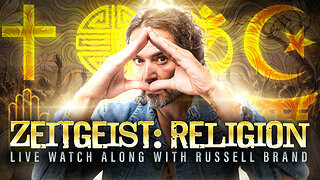Premium Only Content

Trust Is Important
Trust Is Important
https://jack-bosma-the-importance-of-trust.mn.co/share/iaonlBhSZSVMzLA4?utm_source=manual Join us.
https://noblegoldman.com/register/?sk=AfChjAVxY
Trust is a foundational and vital aspect of human relationships, institutions, and societies. It plays a crucial role in various contexts, ranging from personal relationships to business transactions, governance, and global interactions. The importance of trust can be understood from several perspectives:
Relationships and Personal Well-being: Trust is the cornerstone of healthy interpersonal relationships. In personal relationships, whether among family members, friends, or romantic partners, trust fosters emotional intimacy, communication, and a sense of security. Without trust, relationships can become strained, leading to misunderstandings, conflict, and even breakdowns.
Effective Communication: Trust is essential for effective communication. When individuals trust each other, they are more likely to be open, honest, and transparent in their conversations. This, in turn, leads to better understanding, collaboration, and problem-solving.
Business and Economics: Trust is a fundamental element in economic activities. In business transactions, trust between buyers and sellers, employers and employees, and business partners is crucial. Trust reduces the need for excessive contracts and legal safeguards, saving time and resources. It also encourages repeat business and customer loyalty.
Social Cohesion: Trust is a glue that holds societies together. When people trust one another, they are more likely to cooperate and work towards common goals. Trust contributes to social cohesion, community involvement, and a sense of belonging, leading to stable and harmonious societies.
Institutions and Governance: Trust is essential for the proper functioning of institutions and governments. When citizens trust their leaders and institutions, they are more likely to participate in civic activities, follow laws, and support policies. In contrast, low levels of trust can lead to social unrest, political instability, and a breakdown of democratic processes.
Innovation and Risk-Taking: Trust fosters an environment where innovation can thrive. When individuals trust that their ideas will be valued and their efforts acknowledged, they are more likely to take risks and contribute creatively to their fields.
Global Interactions: Trust plays a crucial role in international relations and diplomacy. Countries that trust each other are more likely to engage in diplomatic negotiations, trade, and cooperation. Trust between nations can help prevent conflicts and contribute to global stability.
Mental and Emotional Well-being: Trust also has personal psychological benefits. When individuals trust others, they experience reduced stress and anxiety. The feeling of being supported and understood positively impacts mental and emotional well-being.
Ethics and Morality: Trust is often intertwined with ethical considerations. Being trustworthy and earning the trust of others are seen as moral virtues. Acting in ways that align with these virtues contributes to a more ethical and moral society.
In summary, trust is the foundation upon which human interactions, relationships, and societies are built. It's a complex and multifaceted concept that brings stability, cooperation, and positive outcomes to various aspects of life. Building and maintaining trust requires consistent honesty, reliability, and integrity, and the benefits of trust ripple through every level of human existence.
#online #event #presentation
-
 2:45:13
2:45:13
Barry Cunningham
12 hours agoCBS CAUGHT AGAIN! CHICAGO A MESS! LISA COOK IS COOKED AND MORE LABOR DAY NEWS!
90.3K42 -
 LIVE
LIVE
StevieTLIVE
6 hours agoMASSIVE Warzone Wins on Labor Day w/ Spartakus
382 watching -
 10:46:42
10:46:42
Rallied
12 hours ago $13.17 earnedWarzone Challenges w/ Doc & Bob
187K3 -
 3:26:25
3:26:25
Joe Donuts Live
5 hours ago🟢 Lost in Space with My Clones: The Alters Adventure Begins
27.5K2 -
 7:20:22
7:20:22
Dr Disrespect
14 hours ago🔴LIVE - DR DISRESPECT - TRIPLE THREAT CHALLENGE - WINNING AT EVERYTHING
210K12 -
 2:35:33
2:35:33
Chrono
7 hours agoBirthday-eve Stream | Helldivers II
23.3K1 -
 54:40
54:40
BonginoReport
1 day agoLABOR DAY SPECIAL! The Best of Nightly Scroll - Nightly Scroll w/ Hayley Caronia (Ep.124)
129K14 -
 2:39:21
2:39:21
Joker Effect
5 hours agoReviewing the downfall of Kick Streaming. Kick streamers welcome to Rumble! Stake bombshell found!
33.8K1 -
 1:06:10
1:06:10
Russell Brand
14 hours agoThe Greatest Lie Ever Told? - SF625
97K111 -
 3:25:13
3:25:13
elwolfpr
6 hours agoBlack Ops 6: Rise of the Relentless
12.8K1